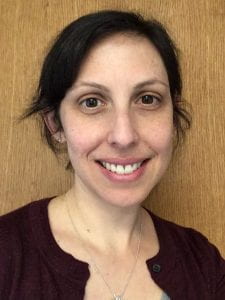Faculty Spotlight: Emily A. Weiss

By Irena Garic
What Chemistry class / professor did you enjoy the most as an undergraduate or graduate student and why?
My favorite class as an undergraduate was a graduate-level quantum mechanics course taught by Prof. Herschel Rabitz (also my undergraduate research advisor). I remember it as being the one class that gave me confidence I could possibly be successful in chemistry graduate school and showed me what I really liked about chemistry.
Tell us what you enjoyed the most about being a Northwestern Ph.D. student?
So many things! My labmates were my best friends. We couldn't get enough of each other. We would work all day together and then still want to hang out after hours. We were all very motivated, and having people like that around you -- who want to excel, but not at your expense -- really gets you up in the morning.
Describe your teaching style?
I teach freshman, so mostly, I try to link every fact or problem I present back to a few simple principles that dictate the behavior of the Universe. Doing this hopefully makes students believe that, if they can understand a small number of guiding principles, they will be able to go after any problem in science.
What are your current research interests?
I'm currently very focused on finding a way to make excited state colloidal nanoparticles (energized by light) behave like enzymes…specifically, to do multiple sequential catalytic reactions with high selectivity. Nanoparticles are good candidates for this kind of bio-mimetic system because you can tune their surface chemistry to adsorb/desorb different molecules, arrange molecules on their surfaces in specific activated geometries, and initiate redox reactions, just like many enzymes.
What are some potential applications for the work that you’re doing?
Hopefully we can access new chemical reactivity not available through traditional "thermal" synthetic methods. We are going after entirely new molecules that, without this type of enzymatic catalysis, are prohibitively high-energy. I'm also interested in applications photo-driven polymerization, de-polymerization (degrading plastics in an environmentally responsible way), and conversion of greenhouse gases to useful fuels.
What is the best part about being at the Northwestern University?
There are many good things about Northwestern, but what I appreciate most on a day-to-day basis is the high quality of graduate students and postdocs we can attract here. I try not to take for granted how smart, motivated, and well-rounded the researchers are here. It's good to feel obsolete once in a while because your lab runs all by itself!
Do you have any advice for female researchers considering a career in academia?
Take risks! I believe, as women and scientists, we are generally very calculated, but academia is inherently a risky business and there's a lot of rejection Involved. Staying in your comfort zone, scientifically and otherwise, often doesn't bring as much success as venturing outside it. The biggest accomplishments of my career so far have been in areas in which I'm not necessarily trained, but which I find really fascinating. There are certainly barriers to publishing in these areas, but you have to start somewhere.
What is one thing not on your CV that you would like us to know?
I have a four-year-old and a one-year-old and they constitute my second job right now. Life is a bit tough, but watching them change is fun.
